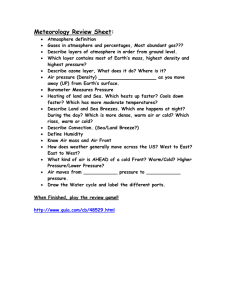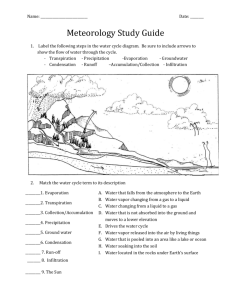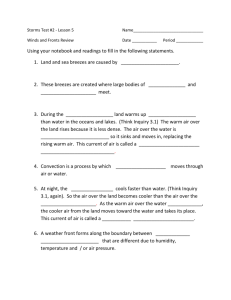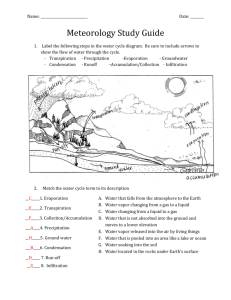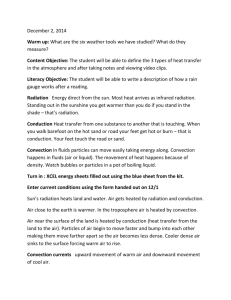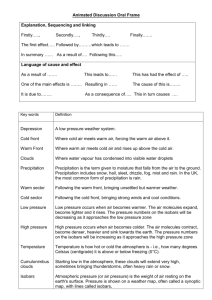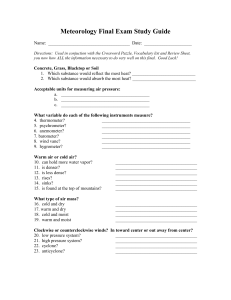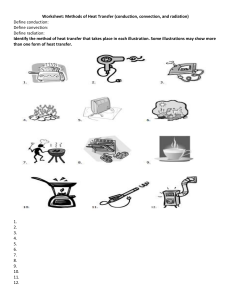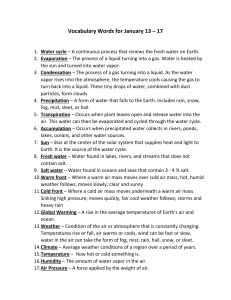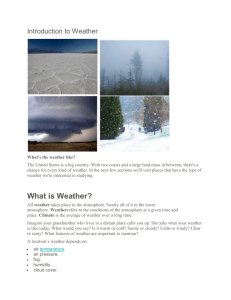Meteorology Study Guide
advertisement
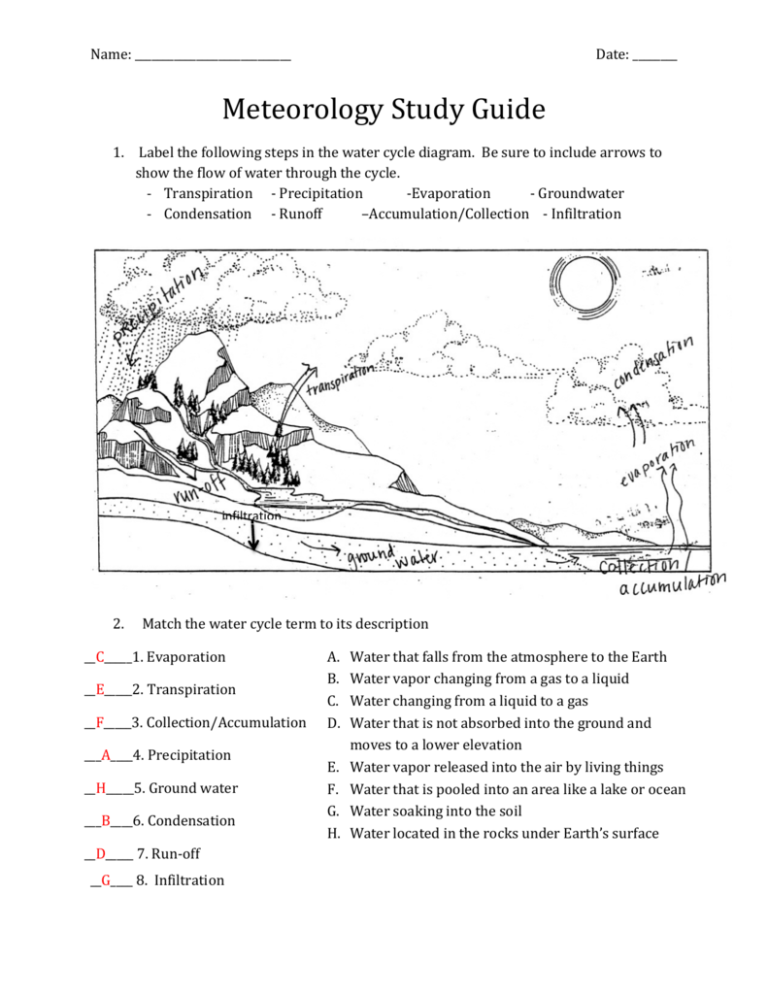
Name: ____________________________ Date: ________ Meteorology Study Guide 1. Label the following steps in the water cycle diagram. Be sure to include arrows to show the flow of water through the cycle. - Transpiration - Precipitation -Evaporation - Groundwater - Condensation - Runoff –Accumulation/Collection - Infiltration infiltration 2. Match the water cycle term to its description __C_____1. Evaporation __E_____2. Transpiration __F_____3. Collection/Accumulation ___A____4. Precipitation __H_____5. Ground water ___B____6. Condensation __D_____ 7. Run-off __G____ 8. Infiltration A. B. C. D. E. F. G. H. Water that falls from the atmosphere to the Earth Water vapor changing from a gas to a liquid Water changing from a liquid to a gas Water that is not absorbed into the ground and moves to a lower elevation Water vapor released into the air by living things Water that is pooled into an area like a lake or ocean Water soaking into the soil Water located in the rocks under Earth’s surface 3. List the 5 layers of the atmosphere in order. Star the layer that we live in. Outer Space ____Exosphere_______________________ Try Studying More Than Everyone ____Thermosphere__________________ ____Mesosphere_____________________ ____Stratosphere_____________________ _____Troposphere____________________ Earth 4. Name the two most abundant gases in the atmosphere. _______Nitrogen and Oxygen___________________________________________________________________ 5. Write the layer of the atmosphere next to the description. (Some will be used more than once.) Layer Troposphere Mesosphere Stratosphere Exosphere Troposphere Thermosphere Description Layer that contains most of the air molecules in the atmosphere Coldest layer, found above the stratosphere Contains ozone The fewest number of air molecules Rain, clouds, snow The largest layer, very high temperatures 6. The ozone layer protects the Earth from what? ______UV Rays________________________ 7. Draw 3 diagrams to show how radiation, convection, and conduction heat the Earth. Be sure to include a brief explanation for each diagram. 8. Label each description of heat transfer as Radiation, Conduction, or Convection: _____convection__________ 1. A radiator (heater) heating a room _____conduction__________ 2. Your hand holding an ice cube _____convection__________ 3. Boiling a large pot of water _____radiation____________ 4. The seatbelts in a car getting hot on a sunny day _____conduction__________ 5. Cooking pancakes on a griddle 9. What is the difference between conduction and convection? ____Conduction is the transfer of heat through DIRECT CONTACT. Convection is the flow or movement of a liquid or gas.________________________________________________________________ 10. Why can more water vapor be present in warm air than in cold air? (Hint, think about how the air molecules are spaced apart) Warm air expands, creating more space for the molecules. This expanded warm air allows more water vapor to be present than in constricted cold air._____________ 11. What causes air pressure? Air pressure is caused by gravity pulling on the earth’s surface creating pressure, especially for the molecules closest to earth. 12. As you are driving, you notice a fast moving convertible with a fabric top quickly passing your car. The fabric roof of the convertible is bulging up, as if air was getting under the roof. Describe how this relates to air pressure. ____ Air moves from an area of high pressure to an area of lower pressure. As the car moves fast it creates an area of low pressure above the roof of the car. The air that is inside the car (high pressure) will try to get to the lower pressure, pushing up on the material roof. _____________________________________________________________________________________ 13. What is wind?____The movement of air from an area of higher pressure to an area of lower pressure. _______________________________________________________________ 14. What causes sea breezes and land breezes? ____ Land heats up faster than water. The air over the water wants to move from an area of higher pressure (cooler air) to an area of lower pressure (warmer air) during the day. At night it is reversed because the land cools faster than water. 15. What causes global winds?__ The curve of our planet causes the uneven heating of the Earth’s surface by the sun, which causes some areas to be warmer (have lower pressure) than others._________________________________________________________________________ 16. What are the doldrums?____Windless zones near the equator__________________________ 17. What is the only substance that exists as a solid, liquid, and gas in Earth’s atmosphere?__________water____________________________________________________ 18. Identify the front and weather. Front Warm front Weather Light rain, can rain for extended periods. Warmer temps and clear skies follow Occluded front Cooler temps and a lot of rain Cold front Stationary front Symbol (red) (purple) Thunderstorms, heavy rain, cooler temps (blue) Light wind and precipitation 19. Label the front. Occluded front (blue and red) A cold air mass moves towards a cool air mass with a warm air mass between them. The warm air mass gets pushed up. Warm front A warm air mass moves towards a cold air mass, and the warm air mass slides over the cold air Cold front A cold air mass moves towards a warm air mass and pushes the warm air up Stationary front A cold air mass and a warm air mass move next to each other and just stay there. 20. Write the correct letter next to each description. You may use a letter more than once and you may use more than one letter on a line. A. Cumulonimbus B. Stratus C. Cumulus _D_________ 1. Beautiful blue sky with wisps of high clouds _C_________ 2. Cotton puffballs, low altitude _A_________ 3. Thunderstorms, heavy rain D. Cirrus __B________ 4. Sky looks “whited out”, there is no sun, but it isn’t raining either. __C, D_____ 5. All cloud types that are not associated with precipitation 21. List 4 examples of severe weather. ______Hail, Blizzard, Tornado, Hurricane, Thunderstorm.___________________________________________________________________________________ _____________________________________________________________________________________________________ 22. What is the difference between a hurricane and a tornado? ____________________________ ___A hurricane is a tropical storm that forms over warm oceans. A tornado is when a funnel cloud forms at the base of a cumulonimbus cloud and touches the ground.____________________________________________________________________________________________ ______________________________________________________________________________________________ 23. A. If the humidity outside is 100%, what type of weather would you predict? _____Cloudy with Rain_(Precipitation)____________________________________________________ B. What if the humidity was 0%? ____Clear skies, no clouds._______________________ 24. Name the tool that is used to measure the weather factor: Temperature Thermometer Wind speed Anemometer Wind Direction Air Pressure Weather vane; Wind sock Barometer 25. What influences climate? What body of water influences the climate of Pennsylvania? _____Land features including large bodies of water, mountains, valleys, cities, etc. The Atlantic Ocean affects Pennsylvania’s climate.____________________________________________________________________________________________ 26. Why do we have seasons? ___Seasons are caused by the tilt of the Earth as it rotates around the sun. During our winter the northern hemisphere is tilted away from the sun, receiving less sunlight. During our summer, the northern hemisphere is tilted towards the sun receiving more sunlight.___________________________________________ _____________________________________________________________________________________________________ 27. Describe the RELATIONSHIP between each word pair: a. air pressure/ air temperature : ___higher temperature (warm air) rises has lower pressure, causing it to rise. Colder temperatures have higher air pressure._____ ____________________________________________________________________________________________ b. humidity/ air temperature : __warmer temperatures are able to hold more water vapor than lower temperatures._______________________________________________ _____________________________________________________________________________________________ _____________________________________________________________________________________________ c. fronts/ air masses : __when 2 different air masses meet, a front is created._______ _____________________________________________________________________________________________ d. wind/ air pressure : ___wind is created when air moves from areas of high pressure to areas of low pressure.____________________________________________ ____________________________________________________________________________________________ e. lightning/ thunder: __thunder is the sound created by the rapid heating of the air around a lightning bolt._________________________________________________________________ 28. Label each air mass with its 2 letter abbreviation and 2 word description. Cold, Dry cP Cold, wet Cold, wet mP mP warm, wet mT warm, dry cT warm, wet mT 29. Look at the table below. It shows the results of an experiment designed to study the effects of a fertilizer on tomato plants. A. Write a possible hypothesis for the experiment. __If the amount of fertilizer given to a plant is increased then the plant will grow taller.____________________________________________________ _________________________________________________________ _________________________________________________________ _________ B. What was the dependent variable? _Plant height__________ C. What was the independent variable? _Concentration (amount) of fertilizer given to plants_______________________ D. What was the control group? __Group W___________________
